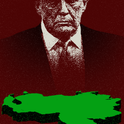Any year in which the visage of Nigel Farage is given such regular exposure is inevitably a bad one. First, there was the whole Brexit campaign and then his speech to the European Parliament on 28th June, telling MEPs that most of them had never done a proper job. Last weekend, he met with the President-Elect at Trump Tower in New York, emerging with visible joy. Unsurprisingly, Farage was there to outflank the British government. It worked: this morning an unprecedented tweet by Donald Trump actively called for Farage’s appointment as ambassador to the US, willfully ignoring the fact that Kim Darroch already holds that prestigious post.
Theresa May hasn’t been having any of it. The prime minister and Donald Trump had chatted on the phone said a spokeswoman: “The President-Elect talked about enjoying the same close relationship that Reagan and Thatcher did. I don’t remember there being a third person in that relationship.” Farage has reacted like a child whining that it’s unfair. “It just goes to show they are not really interested in the country or the national interest,” he told LBC, “They are more concerned about petty party politics and trying to keep me out of everything.”
However, is May right to reject his offer of help? Arron Banks, co-founder of the Leave EU campaign, has claimed that Farage and Steve Bannon, Trump’s newly appointed chief strategist “speak and text almost daily,” like high school sweethearts and that Farage has a “hotline to the White House.” History provides some examples of individuals whose influence within the establishment far exceeds their portfolio, wily vagabonds who have weaselled their way in. May can take solace that each ends in catastrophe.
The Puppeteer: Rasputin and Tsarina Alexandra
In the wake of a nationwide fascination with the occult, Rasputin, a holy man and mystic, was invited into the Russian court for his apparent ability to ease the suffering of the haemophiliac prince, Alexei. Rasputin’s closeness to the Tsarina became a source of controversy, but warnings against him came to be seen as an affront by the imperial couple, only increasing their isolation and his sway over them. When Tsar Nicholas left St Petersburg for the eastern front in 1915, Rasputin, capitalising on the Tsarina’s inexperience and malleability, became de facto emperor. He was assassinated in 1916; the Russian Empire dissolved in revolution the year after.
Farage has channelled the rising tide of nationalism and, as he did in Britain, promoted it as the cure for the ailments of middle America. Now Trump has invited him into the inner sanctum. Once again an inexplicably hypnotising imposter threatens to influence an impressionable, untried and impulsive leader of a sprawling nation. Is Farage waiting to pounce in the event of a serious diplomatic convulsion?
The Trusty Steed: Caligula and Incitatus
There are lessons to be extracted from the Roman Emperor’s madness and over-indulged affection for his horse. Sadly, the claim that Caligula made the latter a consul is probably false. Historian Suetonius did claim that the emperor bestowed the beast with a manger of ivory, a stall of marble, purple blankets and a collar of precious stones. Regardless, what did or did not happen is irrelevant: “post-truth” is the Oxford Dictionaries word of the year. What matters is the mythology, the image, the favouritism, the likely insanity and the impetuousness.
Unlike Rasputin, Caligula’s horse lacked the verbal ability to command its master. But the animal’s closeness to him helped to cultivate the resentment that led to his assassination in 41 AD. Farage insists Trump’s preferred currency is loyalty; a claim corroborated by his cabinet appointments so far. If Farage is going to play the sycophant-in-chief to maintain his position at the high table, he shall suffer the recriminations of bitter outsiders and the tempestuous whim of a master growing more reviled by the day.
The Recluse: Wallis Simpson and Edward VIII
As the Netflix drama The Crown depicts, Edward VIII martyred himself for love. Strangely, King Edward’s romance with the American Wallis Simpson is perhaps the most apt comparison with Trump and Farage’s ideological bromance. Both pairs were drawn together by romanticised ideals—myopic protectionism in the latter case—and both eschewed the establishment to be together. Simpson and Edward retreated from London to a mansion in the Bois de Boulogne, Paris. Trump and Farage posed inside a gold-plated elevator amid the faux-Renaissance frescoes of the tycoon’s gilded penthouse.
Edward’s romance created a constitutional disaster and compelled a retirement from office to protect its integrity. Trump, by some accounts, doesn’t seem to revere his office—the New York Times reported that he would rather keep living in his skyscraper rather than move into the White House. Will history repeat itself and the influence of an outsider whose presence insulted the establishment spell disaster?
Two assassinations and a forced retreat from public office to protect the constitution do not bode well for Farage. Individuals who hold what many perceive as illegitimate authority over powerful figures put themselves in a dangerous position. May could be right to dismiss his shameless self-advertising as an irrelevance and wait until he shoots himself in the foot. The past might be a foreign country, but they don’t do things that differently there.
Farage and Trump’s special relationship
Don’t worry Theresa, it will probably end in tears
November 22, 2016

Nigel Farage in Trump Tower ©Evan Vucci/AP/Press Association Images











